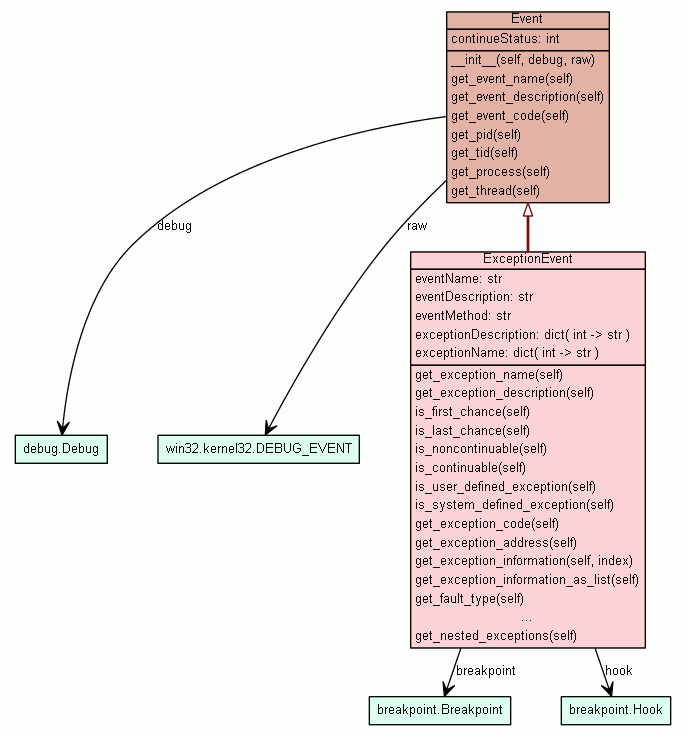
| Home | Trees | Indices | Help |
|
|---|
|
|

Exception event.
|
|||
| str |
|
||
| str |
|
||
| bool |
|
||
| bool |
|
||
| bool |
|
||
| bool |
|
||
| bool |
|
||
| bool |
|
||
| int |
|
||
| int |
|
||
| int |
|
||
| list( int ) |
|
||
| int |
|
||
| int |
|
||
| int |
|
||
| bool |
|
||
| list( win32.EXCEPTION_RECORD ) |
|
||
| list( ExceptionEvent ) |
|
||
|
|||
| int |
|
||
| str |
|
||
| str |
|
||
| int |
|
||
| Process |
|
||
| Thread |
|
||
| int |
|
||
|
Inherited from |
|||
|
|||
| str |
eventName = User-friendly name of the event. |
||
| str |
eventDescription = User-friendly description of the event. |
||
__exceptionMethod = |
|||
__exceptionName = |
|||
__exceptionDescription = |
|||
| dict( int → str ) |
exceptionDescription Mapping of exception constants to user-friendly strings. |
||
| dict( int → str ) |
exceptionName Mapping of exception constants to their names. |
||
|
|||
| Breakpoint |
breakpoint If the exception was caused by one of our breakpoints, this member contains a reference to the breakpoint object. |
||
| int |
continueStatus Continue status to pass to win32.ContinueDebugEvent. (Inherited from winappdbg.event.Event) |
||
| Debug |
debug Debug object that received the event. (Inherited from winappdbg.event.Event) |
||
| Hook |
hook If the exception was caused by a function hook, this member contains a reference to the hook object. |
||
| DEBUG_EVENT |
raw Raw DEBUG_EVENT structure as used by the Win32 API. (Inherited from winappdbg.event.Event) |
||
|
|||
| str |
eventMethod Method name to call when using EventHandler subclasses. |
||
|
Inherited from |
|||
|
|||
|
|
|
|
|
|
Determines if this is an user-defined exception. User-defined exceptions may contain any exception code that is not system reserved. Often the exception code is also a valid Win32 error code, but that's up to the debugged application.
|
|
|
|
|
|
Note: This method is only meaningful for access violation exceptions, in-page memory error exceptions and guard page exceptions. |
Note: This method is only meaningful for access violation exceptions, in-page memory error exceptions and guard page exceptions. |
Note: This method is only meaningful for in-page memory error exceptions. |
|
Traverses the exception record linked list and builds a Python list. Nested exception records are received for nested exceptions. This happens when an exception is raised in the debugee while trying to handle a previous exception.
|
Traverses the exception record linked list and builds a Python list. Nested exception records are received for nested exceptions. This happens when an exception is raised in the debugee while trying to handle a previous exception.
|
|
|||
__exceptionMethod
|
__exceptionName
|
__exceptionDescription
|
|
|||
breakpointIf the exception was caused by one of our breakpoints, this member contains a reference to the breakpoint object. Otherwise it's not defined. It should only be used from the condition or action callback routines, instead of the event handler.
|
hookIf the exception was caused by a function hook, this member contains a reference to the hook object. Otherwise it's not defined. It should only be used from the hook callback routines, instead of the event handler.
|
|
|||
eventMethodMethod name to call when using EventHandler subclasses. Used internally.
|
| Home | Trees | Indices | Help |
|
|---|
| Generated by Epydoc 3.0.1 on Fri Dec 20 17:54:52 2013 | http://epydoc.sourceforge.net |